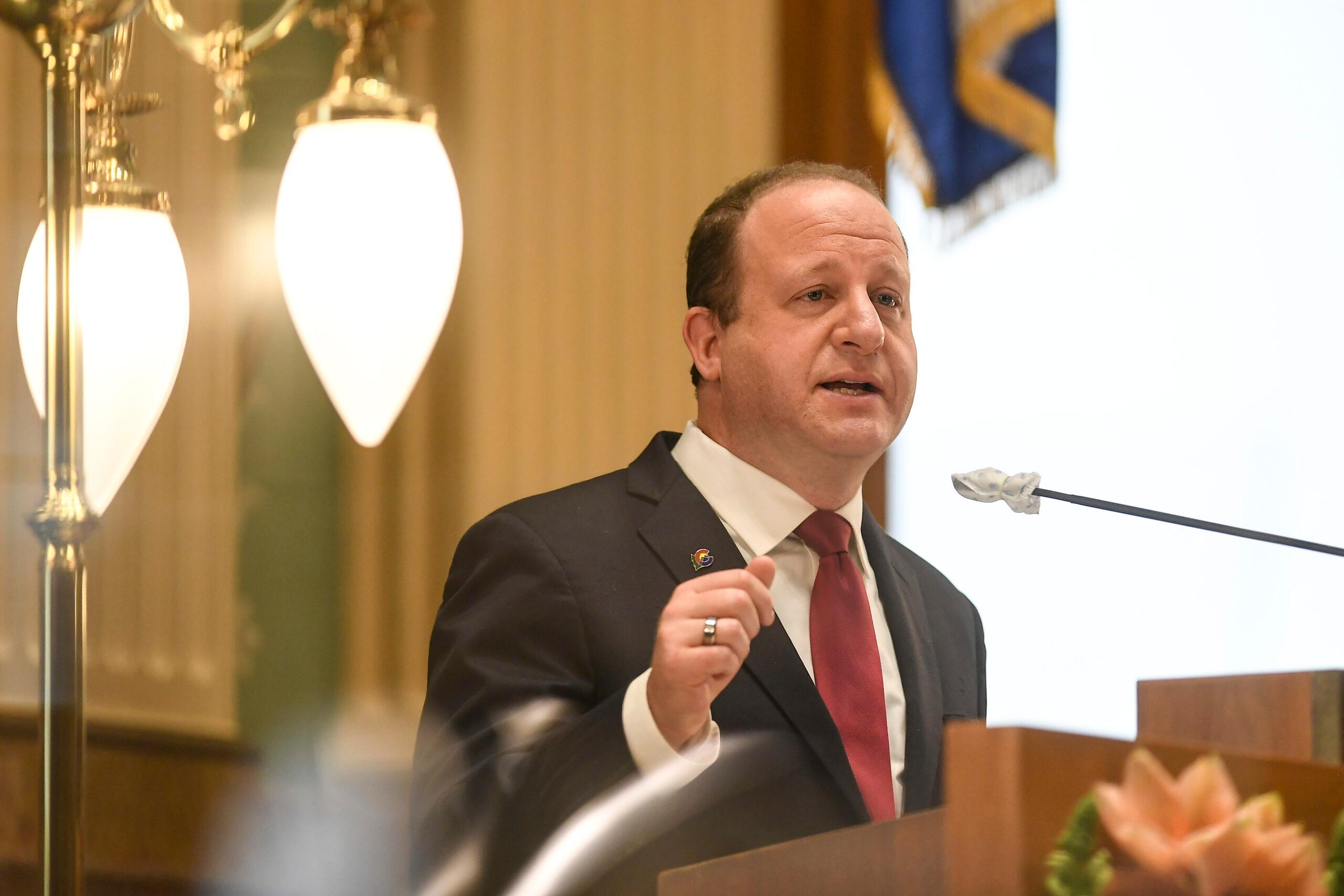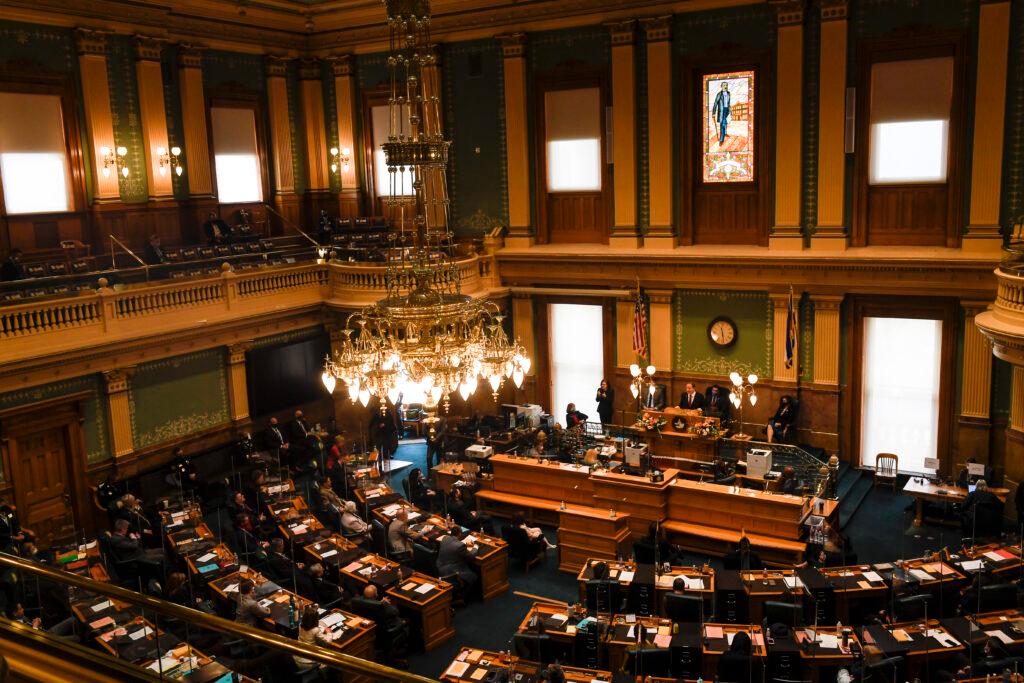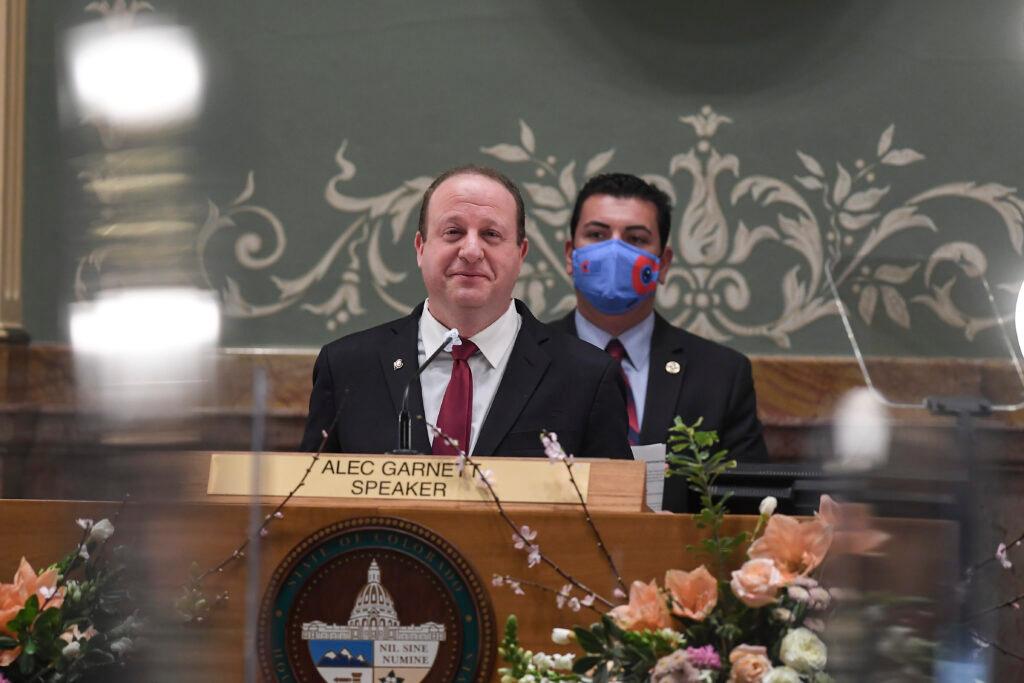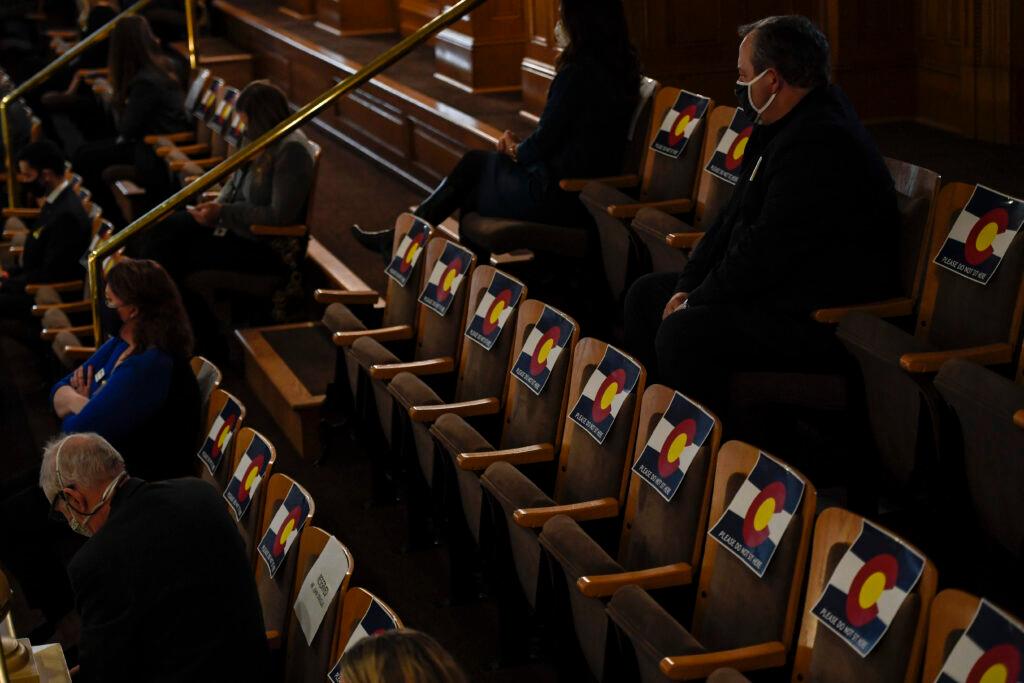
Gov. Jared Polis stood before lawmakers in the state capitol on Wednesday to give his annual address.
The crowd was far smaller than usual, with few of the special guests who normally are invited to the State of the State speech.
Some of the state’s top officials attended virtually, while state senators watched from the gallery and the back of the chamber, instead of crowding in next to their House colleagues.
It was the shortest yet of Polis’ three yearly speeches, but only by a few hundred words. And the message itself marked a fundamental shift from his first years in office.
Much of it reflected a state — and a nation — changed by the yearlong COVID-19 pandemic, a season of historic wildfires, a renewed racial justice movement and the shock of the attack on the U.S. Capitol.

The state of the state is…
In Polis’ earlier speeches, he talked about a state that was “successful,” “strong” and “bold.” His focus in past years was on making the most of Colorado’s economic growth, and building future success by expanding kindergarten and preschool programs, or reforming health care.
This time, it was about acknowledging a state that has been through the “unimaginable” and rethinking the future.
“We’ve worked together to protect our families and our communities, by staying apart. We’ve endured loneliness. We’ve put off joyous weddings, birthdays, and graduations,” Polis said.
The governor spent much of the early part of the speech calling out the “heroes” of the pandemic, including workers in retail, restaurants and grocery stores; first responders and the Colorado National Guard; and state lawmakers and public health officials.
As of Wednesday, 5,655 people had died of COVID-19 in Colorado, Polis said.
“Each loss seared into the mind and collective memory of our state,” he said, pausing for a moment of silence during the Ash Wednesday speech.
“So, the state of the state?” he concluded. “This past year we’ve been bruised, battered and shaken to our core — but nevertheless the state of Colorado remains strong.”

Polis names priorities — most in line with Democrats, one that pleases Republicans
The governor said that the easing of the pandemic is in sight, and he called on lawmakers to think ahead to rebuilding the state’s economy.
“We can see the light at the end of the tunnel — but we’re still some months away from reaching it,” he said.
The state doesn’t have to “go back exactly to how things were before,” Polis added. He called out several budget priorities, including:
- Repairs and upgrades for roads across the state, including the Eisenhower Tunnel. A debate over how to pay for transportation will be a top item for the legislature this year. Polis threw his support behind Democratic lawmakers who plan to propose other fees to pay for transportation, but he didn’t talk about the specifics. Meanwhile, he called for a reduction to vehicle registration fees, which contribute more than $100 million a year toward roads and bridges.
- Expansion of broadband internet access. Polis called for expanded rural broadband access. A bill in the legislature would provide subsidies for families with K-12 students to get broadband and would set up state funding for broadband projects, though Polis didn’t specifically mention it.
- Health care. The governor highlighted his support for two significant health care reform bills. State lawmakers want to regulate prescription drug costs and introduce a potential “Colorado option” health plan.
- Tax cuts and credits. Polis said that the state should partially eliminate the business personal property tax, which businesses pay based on furniture and other goods used at their facilities. He said it should be cut for "small businesses." He also called on lawmakers to give more money back to individual taxpayers by doubling its Earned Income Tax Credit, and funding a Colorado Child Tax Credit, giving up to $600 back to certain families. The idea of a state-level child tax credit has been proposed for years, but the state hasn’t provided the funding to do it. Separately, he called for an end to state taxes on Social Security benefits.
Polis said the tax changes “will deliver the most substantial and comprehensive tax relief in decades for hard-working Colordadans and small businesses,” he said.
It continues an approach that has frustrated some of Polis’ allies: He has supported tax cuts, including a reduction to the state income tax, even while he and other Democrats try to pay for significant new programs.
For Democrats who feel the revenue limits in the Taxpayer’s Bill of Rights have led to chronic underfunding of state services, Polis’ focus on reducing taxes further undermines some of their long term goals. But some of the same ideas drew Republicans and business conservatives to their feet in applause.
"I actually did a double-take at the governor because I couldn't believe my ears," said Republican Rep. Matt Soper.
The state arm of the National Federation of Independent Business said it was “delighted” by the idea of abolishing the business tax, which it said was “a highly annoying and needless paperwork headache” as businesses are forced to calculate depreciation and value for their property each year.

Climate change and equity are broad themes
The governor spoke briefly about climate change, noting that the state’s electric utilities have committed to a significant reduction in carbon emissions.
"How many homes and businesses must we lose — how many lives — before we resolve to meet the threat of climate change with the seriousness it demands?" he said.
But he did not name any specific new carbon reduction plans, instead focusing on new efforts to sell more state parks passes and to reduce wildfire damage.
Polis once again said that Colorado must fix its long-standing racial and economic inequities. That filtered down through other priorities, but Polis specifically called out the disparities that have left people of color with lower vaccination rates.
“We can, and we will, do better,” he said, mentioning a program of “pop-up” vaccine clinics in “rural and urban underserved areas.”
Later in the speech, Polis returned to the equity theme, saying that all Colordans were in “the same storm,” but “not in the same boat” — a metaphor meant to express how people in different communities and economic classes are affected differently by the pandemic.
It was time, he said, to build a better boat -- a line that Rep. Leslie Herod said was her favorite of the speech.
"I'm proud to say that the governor opened his speech talking about equity and equality," said Herod, the chair of the Black Democratic Legislative Caucus. "And then the governor really framed all of his conversation around that, and I think that was so very important."
Rep. Hugh McKean, the Republican leader in the state House, said that Polis' speech came at the end of what may have been the "worst year ever," but it only marked the beginning of the legislative session to come.
"It's the beginning of a really long conversation -- 116 days long," he said. He expected "a lot of talking and a lot of negotiation," especially about how Democrats would pay for some of their biggest ambitions.








